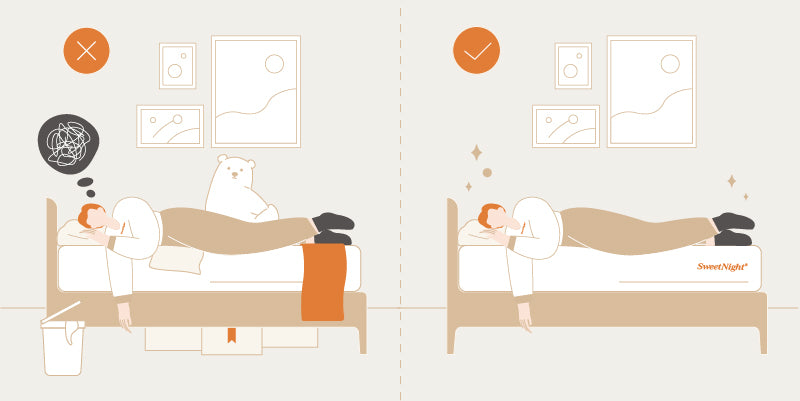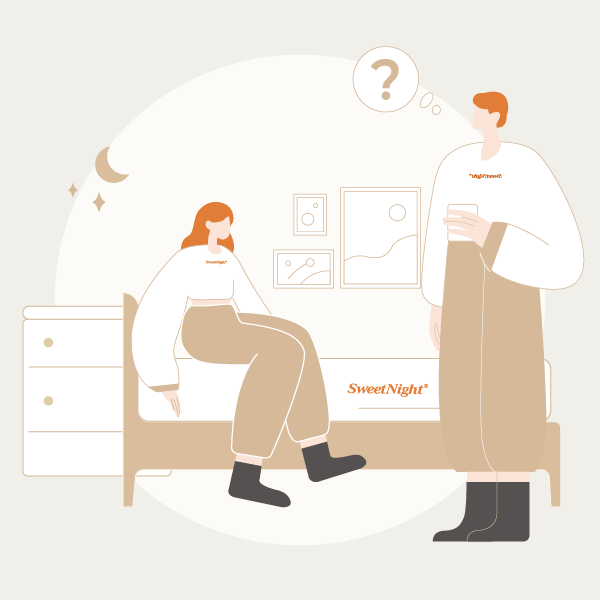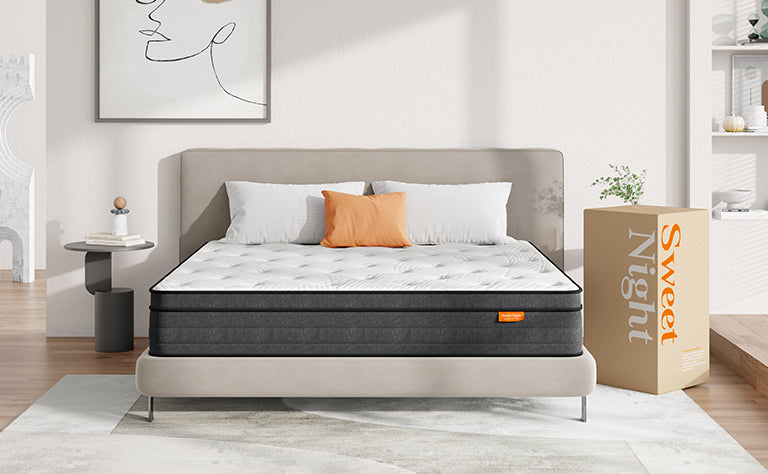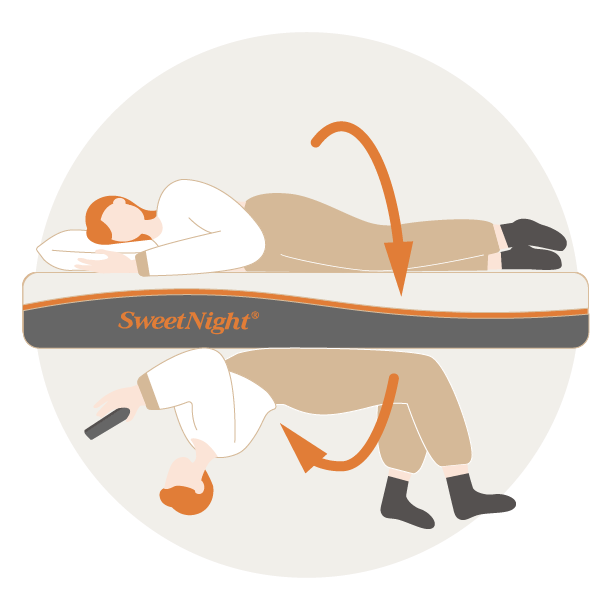Sleep&Health
Why Do I Get Hot When I Sleep?
Do you often find yourself tossing and turning, or feeling too hot to fall asleep? You are not alone, a study shows that 2 in 3 people are experiencing nighttime heat discomfort, making it even more difficult to have a good night’s rest. Let’s dive into why we are bothered by temperature and find some practical cool solutions together to combat the heat and to get the quality sleep we deserve.

CONTENTS
- Temperature Effects on Sleep
- Common Causes
- External Causes
- How to Sleep on Hot Nights: Practical Solutions
- Conclusion
- FAQs
Temperature Effects on Sleep
Most people will find that when they feel sleepy, their body starts to cool down. Why is this? This phenomenon can be traced back to millions of years ago when humans lived in caves and hunted for survival. Due to the natural cycle between day and night as ambient temperature starts to drop in the evening, our body temperature starts to drop as well. The brain then suggests: how about we take a rest? We react : Oh, that sounds great!
It may seem illogical at first that our bodies would become colder at night, but the day/night patterns are what causes this. The hypothalamus receives light as it passes through our eyes. Then, the hypothalamus functions by producing and secreting melatonin, which starts a cycle in the body that causes the body's temperature to drop in anticipation of sleep. The brain is then naturally instructed to slow down, halt all activities and rest when melatonin levels are high.
Your body temperature drops while you sleep and rise as you are ready to wake up. But when your temperature falls, your body radiates heat outwards, warming any surface your skin comes into contact with including your mattress in the process. In short, when night falls, your body releases heat to lower body temperature and prepare for a good night's sleep. Should you sleep hot, you can check and see if it is because of the following reasons.
Common Causes
1.Hormonal Factors
Did you know that hormones have a significant influence on your internal temperature? Yes, estrogen tends cause the body to lower temperature through heat dissipation response, where as progesterone promotes heat retention. Your body temperature may rise while you sleep due to hormonal imbalances or variations involving progesterone or estrogen. Especially typical for women throughout their menstrual cycle or during pregnancy.
2.Infections
Infections is an obvious factor that causes body temperature fluctuations during sleep. A rising internal temperature typically means your body is fighting off bacteria and viruses. The increase in body temperature may leave most people feeling hot or cold throughout the night. Common illnesses and infections include flu, sinus infections, and urinary tract infections can cause nighttime discomfort.
3.Menopause
If you are experiencing menopause, this can be the main reason that causes you to sleep hot at night. For women, the decrease in estrogen levels leads to hot flashes and night sweats. These sudden changes can make sleep difficult. Hot flashes can last for several minutes and can cause profuse sweating, making it even harder to stay comfortable during the night.
4.Stress and Anxiety
Mental health is closely associated with our physical health, anxiety can cause gastrointestinal diseases and sleep disorders. When you encounter high amounts of stress or worry, your body may go into “fight or flight” mode, which raises your heart rate and blood flow. Your hot sleep episodes may be exacerbated if you encounter regular tension or anxiety.
5.Medications

Some drugs can make you feel too hot to sleep. The internal temperature regulation of your body can be affected by medications such as antidepressants, antipsychotics, and hormone replacement therapy. Before making any changes to your drug routine, it's necessary to talk to your healthcare professional first before consider making tweaks to improve sleep.
6.Pre-sleep Activities
Think back over your day, you may find out why you feel hot while you are sleeping. Unknowingly, you may engage in some activities before bed that could raise your body temperature and make it more challenging for you to fall asleep.
- Drinking alcohol. There is a general misconception that alcohol can help sleep. In fact, alcohol actually speeds up your heart rate and maintain your brain in an excited state. Your rapid heartbeat can increase your core temperature initially, but the blood vessel dilation that causes the blood to move to the surface of the skin causes rapid temperature drops. Excessive alcohol consumption combined with cold temperatures may result in hyperthermia.
- Exercising Before Sleep. Most people know that exercise is important for health and for well-being. Getting enough of a work out during the day can help get you in the mood for sleep later in the evening. However, exercising too close to sleep time might not be the best course of action for quality sleep. Through exercise your core body temperature increases and heart rate increases. Depending on the intensity of your fitness routine it could cause you to be too hot and psyched for sleep. Therefore, make sure your physical activities are between 1-2 hours before sleep so that you have time to calm down and be cool enough for bed.
- Consuming Heavy or Spicy Food. Heavy food full of fats, carbs, spicy food, and caffeine can crank up the heat at night. Spicy food is known to increase heartburn and acid reflux symptoms as we as indigestion. Some experts believe that consuming spicy meals close to bedtime may raise body temperature, which may be detrimental to sleep. Sleep disturbances are associated with increased body temperature. Leave at least 3-4 hours between meals and bedtime so that foods in general don't disturb your stomach before bed.
External Causes
1.Temperature and Humidity of Sleep Environment

Your sleeping environment plays an important role in a good night’s sleep. The temperature and humidity can have an impact on how hot you feel at night. Your body determines when it is time to sleep using your natural circadian rhythm. Melatonin production and variations in your body’s core temperature have an impact on your sleep-wake cycle. Your body’s cycle might be disrupted if you sleep too hot or regularly wake up from sweat. It can be hard for your body to cool off and maintain a healthy temperature in a room that is overheated or has a high humidity level. For the best sleep, the ideal temperature and humidity of bedrooms are 60-67°F (16-19°C) and 40-60%, respectively.
2.Mattress
Your sleep temperature can be significantly influenced by the sort of mattress you sleep on. Traditionally, memory foam mattresses are known to trap heat, making them unsuitable for people who tend to sleep hot. However, newer gel-infused memory foam, latex, innerspring or hybrid mattresses, on the other hand, offer great body heat transfer capabilities combined with superior air-circulation to keep you cooler while you sleep.
3.Sheets and Bedding
Your sleeping temperature may also be affected by the materials of your sheets and bedding. Natural textiles like cotton or linen are more breathable and can help regulate your body temperature, but synthetic materials like polyester can retain heat and make you feel too hot to sleep. The weight and thickness may also have an impact on how hot you feel while sleeping. Choosing lighter, more permeable bedding helps to make you more comfortable and maintain a cool temperature during sleep.
4.Sleepwear

What you wear to bed can also contribute to nighttime heat discomfort. Multiple layers of clothing or thick, unbreathable textiles can gather heat and leave you feeling bothered. Choose something that is light and breathable for the summer and when the nights get cold towards winter pick something sensible to go with your winter duvet or central heating.
5.Sleep Partner

Yes, having a partner in the bed also increases the temperature. The combined body heat of either your loved one or a pet sleeping on top of you can make it quite hot at night. The most sensible way is to probably wear just enough and take into consideration the temperature difference with or without a partner in bed. Heat is a continual consequence of metabolism in living things. The area will heat up more swiftly the more people there are and the smaller the area is.
How to Sleep on Hot Nights: Practical Solutions
Invest in a mattress with cooling technology
If your mattress is the main cause of your temperature issues at night, think about buying a cooling mattress. A cooling mattress can help keep you at the right temperature by promoting ventilation and dissipating heat. Innerspring, hybrid, and memory foam mattresses with gel infusion are a few of the most popular cooling mattress options available.
Adjust your room temperature and humidity
To create an ideal sleeping environment, focus on regulating your room’s temperature and humidity. A thermostat can set your bedroom temperature between 60-67°F (16-19°C) and consider using a humidifier or dehumidifier to maintain a humidity level between 40-60%. Additionally, using fans or air conditioning can help circulate air and keep your room cool.
Take a hot bath
Yes, instead of having a cool bath, a hot bath is better for our sleep. Research shows that bathing 90 minutes before bed in water at 104-109°F (40-43°C) can help you nod off on average ten minutes earlier than usual. A hot bath can help you to lower your core temperature, and send the signal to your brain that it is time to sleep.
Sleep with breathable clothes
Your choice of sleepwear can, as was already noted, significantly affect the temperature at which you sleep. Choose lightweight and moisture-wicking sleepwear made from natural materials like cotton and bamboo or consider sleeping naked can cool down during sleep. Avoid wearing bulky, impermeable materials since they can trap heat and keep you feeling too hot to sleep.
Reduce clutter on your bed

Maintaining your sleeping environment in a neat and tidy arrangement is beneficial for your sleep. We spend more time in our beds than in any other space or room. Consider your bedroom as a cozy, tranquil haven where you may rest and rejuvenate. Too much clutter on your bed with things you don’t need can limit the space you can have a rest. In addition, the stacking of clutter on your bed is also detrimental to air circulation, especially when your breathing slows down while you sleep.
Kick out your sleep partner
If all else mentioned above fails, consider sleeping separately or replacing a larger bed for more space. This help you stay cool during sleep. Just like that song from Chicago 'even lover's need some time away...'
Stay hydrated
Staying hydrated through the day and into the evening can aid in your body’s breakdown of waste and release of toxins through sweat.
Before going to bed, it can be helpful to cool your body down with a little water or a cold drink if its a scorching summer or hot environment. But avoid drinking a lot of water in a short period of time especially before bed as it may result in frequent trips to the bathroom throughout the night.
Using the blackout curtain in your room
Blackout curtains are made of densely woven fabric, they are heavy-duty and designed specifically to block out light as much as possible. Blackout curtains typically have a thermal lining or triple-layer design that reflects heat and keeps it from entering your room. As a result, even on scorching summer days, your room will remain cooler and more comfortable for sleep.
Upgrade your bedding and pillows
Except for your mattress, your bedding and pillows also play a significant role in lower your temperature when you sleep. Looking for bedding and pillows that is temperature regulating can help you sleep at an optimal temperature. Get something that suits the season as opposed to using the same duvet from winter to be used in summer.
Freeze your head and feet
Physical cooling can also solve the problem of sleeping too hot. All you need to do is rub cool water all over our body or place an ice pack on our forehead to physically cool down. You can freeze some soaked towels and put them on our forehead, armpits, as well as our feet. But make sure you don't make a mess or soak your mattress.
Sleeping in a lower area
Cold air tends to sink in the same volume of an indoor setting because it is denser and heavier. If it is too hot to sleep, try sleeping in a sleeping bag on the floor of your room. However, we don’t recommend this should you have spinal issues.
Make your own air conditioner

One easiest technique is placing a full bowl of ice cubes in the direction of a fan’s airflow should you don’t have AC in your home. Because air is a poor conductor of heat, in a room the air near an ice bowl may only be 50°F (10°C) while the air temperature at a distance can still remain 86°F (30°C). Thus it means that we need to sleep as close as possible to the ice bowl to feel the cooling effect.
Consult healthcare professional
If you have tried everything humanly possible, and your symptoms remain unrelieved or even more serious. Maybe it is time to consult healthcare professionals.
Continuous nighttime heat discomfort can be a sign of an underlying medical issue or a side effect of the medication you’re talking about. This discomfort causes a frustrating and annoying sleeping experience for you, which could lead to long term issues. Your healthcare provider can help identify the cause and recommend appropriate treatment or solution
Conclusion
Persistent heat discomfort is detrimental to your overall health and well-being. It is in your interest to create a cooler, more comfortable sleeping environment. If your evening heat discomfort persists, make sure to speak with your healthcare professional since they can give you great advice and solutions to deal with your temperature related discomfort. Happy sleeping!


